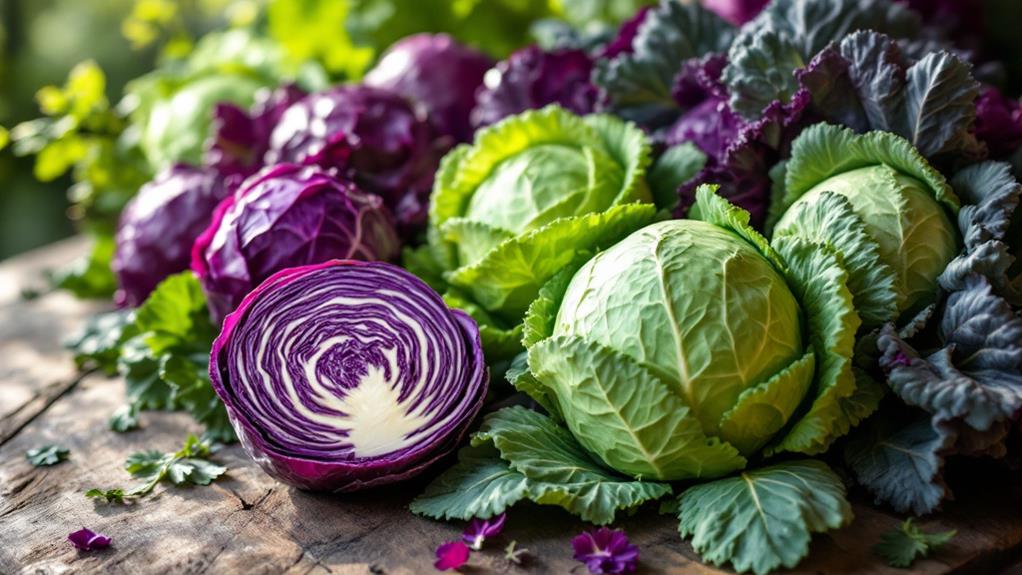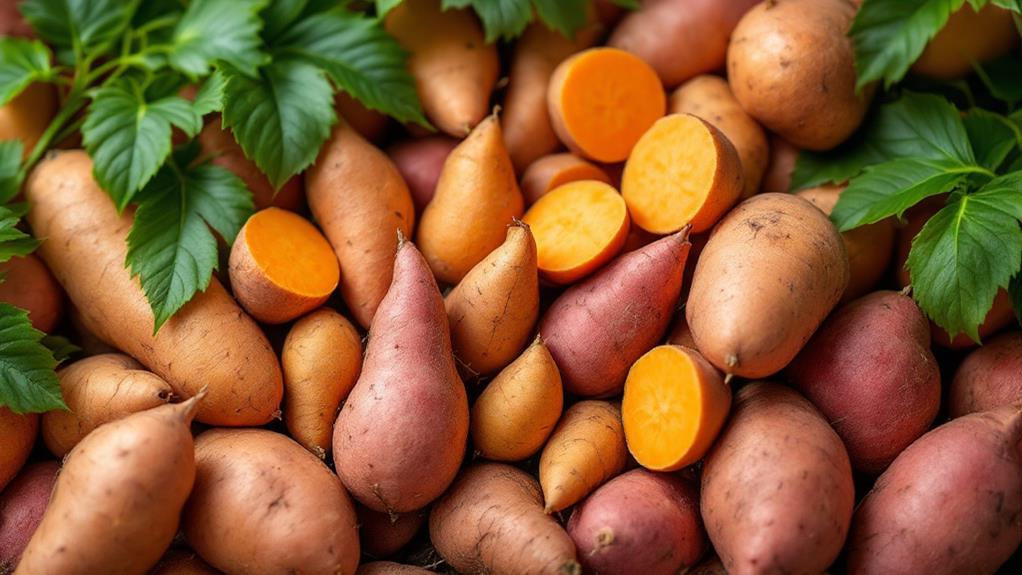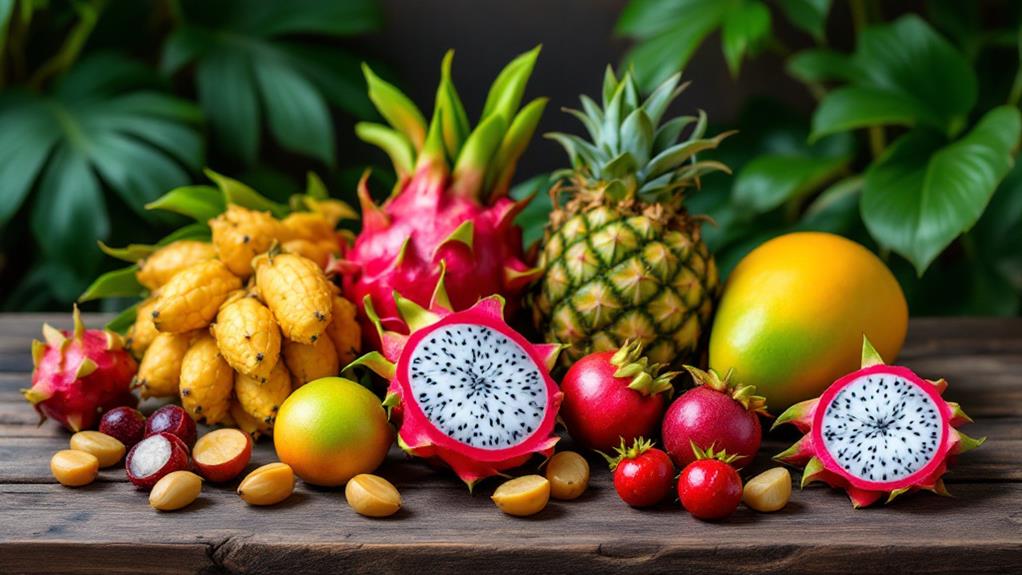A Comprehensive Guide to the Different Types of Fruits
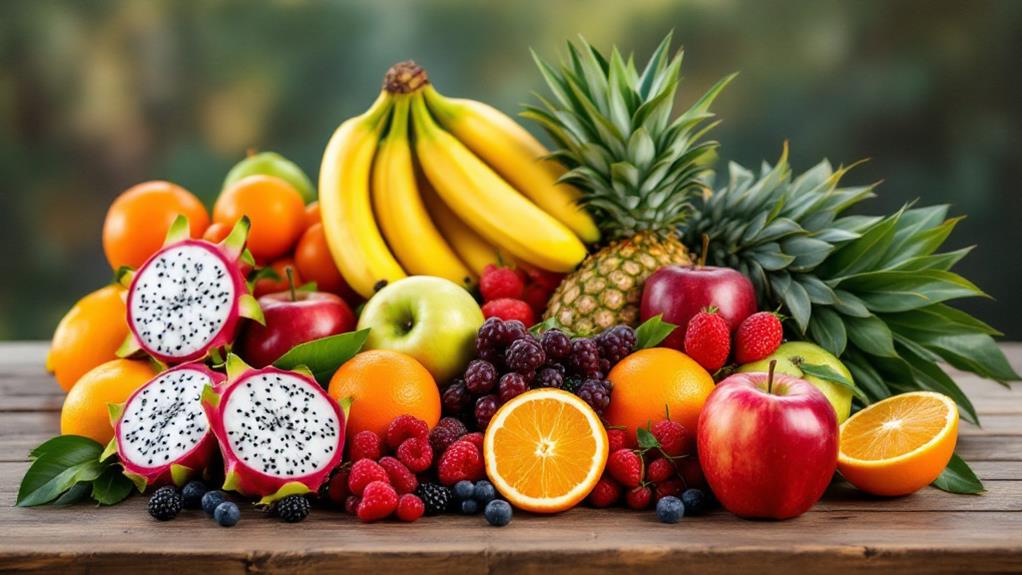
Explore the colorful world of fruits, where simple fruits like apples and berries arise from single ovaries, while aggregate fruits like raspberries form from several. Uncover multipurpose fruits like pineapples that blossom from a flower cluster. Each fruit offers distinct health benefits—vitamin-rich for immune support or high in fiber for digestion. Enjoy versatile uses; citrus-like lime improves dishes, while exotic fruits like dragon fruit offer unique flavors. Fruits also have specific seasons, like summer stone fruits or winter citrus. Venture further, and reveal how these varieties boost health and culinary experiences through every season and cuisine.
Categories of Fruits
Fruits come in diverse fascinating categories, each with unique traits and origins. When you investigate the world of fruits, you'll uncover they're classified into three main categories: simple fruits, aggregate fruits, and multiple fruits. Simple fruits are the most straightforward; they develop from a single ovary. Within this category, you have drupes like cherries, which have a fleshy outer part and a hard stone inside. Berries, such as blueberries, are another type of simple fruit, characterized by their juicy, fleshy structure without a stone. Pomes, like apples, have a core encasing the seeds.
Aggregate fruits are intriguing because they form from a single flower with multiple ovaries. You'll find examples like raspberries and blackberries, where each little segment is a small fruit, clustered together to create the whole. They're unique in their formation and offer a delightful texture.
Multiple fruits, such as pineapples and figs, are the result of a group of flowers merging into a single fruit structure called an infructescence. Each tiny section of these fruits originates from an individual flower, creating a captivating and complex structure. Understanding these categories helps you appreciate the diversity and complexity of fruits.
Nutritional Benefits
Regarding enhancing your health, you'll find that fruits offer a powerhouse of nutritional benefits. They're brimming with fundamental vitamins and minerals, making them a significant part of your diet. For instance, as a source of vitamin C, fruits like guava and oranges elevate your immune function and promote lively skin health. You can't overlook the importance of dietary fiber found in kiwi and elderberries—these fruits support digestive health and help you feel full, aiding in weight management.
Consider the following benefits that fruits offer:
- Improved Heart Health: Fruits such as honeydew and pomegranate are laden with potassium and magnesium, crucial for maintaining a healthy heart and supporting muscle function.
- Protection Against Chronic Diseases: Antioxidant-rich fruits like raspberries and plums combat oxidative stress, reducing your risk of chronic conditions.
- Enhanced Skin and Vision: With fruits like figs and mangoes, you're getting vitamins A and K, which are essential for maintaining clear vision and healthy skin.
Whether you crave the sweet and creamy texture of a mango or the tangy burst of a raspberry, these nutrient-packed fruits are indispensable for a balanced, healthful diet.
Culinary Uses

From salads to desserts, the culinary uses of fruits are as diverse as they are delightful. You can bring a burst of flavor and nutrition to your dishes by using versatile fruits like figs and mangoes. They work wonders in salads, desserts, and even main dishes, making your meals both tasty and healthy. When you need a quick snack or want to sweeten up baked goods, reach for dried forms of fruits such as figs, goji berries, and raisins. These common fruits add a natural sweetness and delightful texture to your creations.
Citrus fruits, like lime and grapefruit, play an essential role in elevating beverages, cocktails, and dressings. Their invigorating acidity and lively flavors are sure to improve any drink or salad dressing. Meanwhile, berries like blueberries and raspberries are fantastic in jams, syrups, and desserts, not to mention their fresh form. They're packed with vitamins and antioxidants, increasing both flavor and health benefits.
If you're seeking something unique, consider exotic fruits like elderberries and pomegranates. They're perfect for making flavorful jams, teas, and sauces, adding a rich taste to your culinary repertoire. Adopt these fruits to craft unforgettable dishes.
Unique Characteristics
Among the fascinating world of fruits, you'll reveal unique characteristics that set each one apart. Each type of fruit brings its own charm and benefits, enhancing diversity to our diets. Elderberries, for example, must be cooked before consumption due to their bitter taste and potential toxicity in their raw form. Yet, once prepared, they're a good source of vitamins and antioxidants, widely used in a variety of recipes.
Consider the kumquat, a tropical fruit that's truly distinctive among citrus types. You can eat it whole, including the peel, which adds a sweet note to its inherent tartness. This unique characteristic makes kumquats an exciting enhancement to both sweet and savory dishes.
Goji berries are another standout, often celebrated in Chinese medicine. They're regarded as a superfood due to their high antioxidant content and have been used in a variety of health remedies.
Experience the Wonder:
- Elderberries: Transform bitterness into a nutritious delight.
- Kumquats: Experience sweetness in every bite—peel included!
- Goji berries: Unleash the power of ancient health secrets.
These fruits not only offer nutrition but also an exploration through unique flavors and textures.
Seasonal Availability
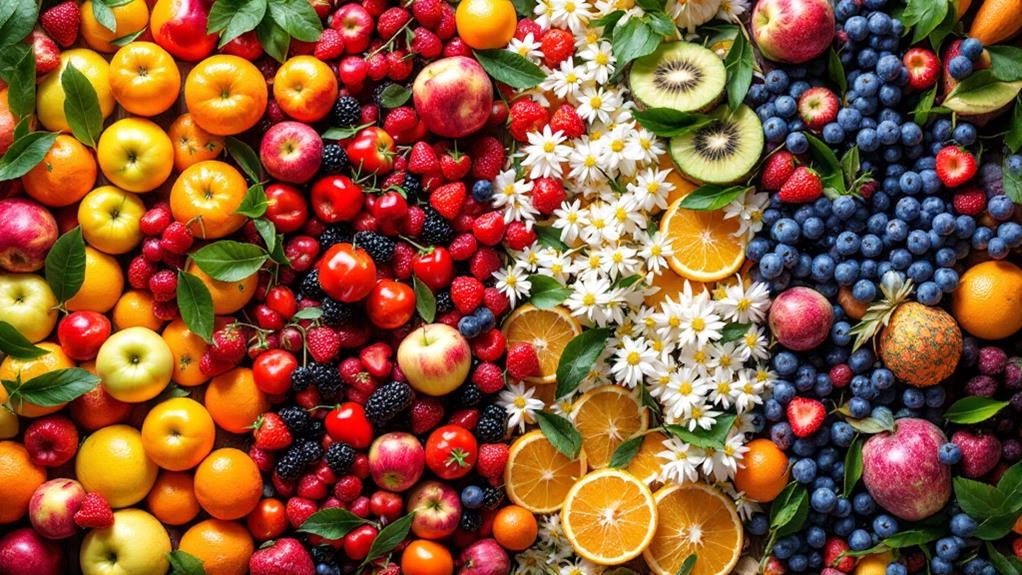
Uncover the rhythm of nature as you investigate the seasonal availability of fruits. During the summer months, the abundance of stone fruits like peaches and plums offers you a splendid range of flavors and textures. These fruits are at their peak, ensuring you experience their freshest and juiciest forms. Fresh gooseberries also make a rare appearance, with their fleeting presence lasting just a few weeks. Their limited availability makes them a cherished seasonal delight that you shouldn't miss.
In contrast, citrus fruits like oranges and grapefruits provide a juicy burst of flavor in the winter, brightening up the cold season with their revitalizing taste. If you're craving the exotic flavor of guava, keep in mind that its fresh form is hard to find. However, you can always turn to canned guava, ensuring you've got this tropical taste available for your recipes year-round.
When fresh fruits are scarce or out of season, dried fruits such as figs and goji berries offer a convenient option. Available throughout the year, they serve as a reliable choice for snacking and cooking, allowing you to enjoy their benefits regardless of the season.
Health Considerations
When you think about incorporating fruits into your diet, consider their wide-ranging health benefits. Fresh fruit is packed with crucial nutrients that promote well-being. For example, consuming fruits high in vitamin C, like guava and oranges, can elevate your immune system. This vitamin also improves iron absorption when eaten with iron-rich foods. Avocados, although technically a fruit, provide healthy monounsaturated fats that support heart health by improving cholesterol levels.
Fruits are also an excellent source of fiber. Common fruits like apples and raspberries aid digestion and help maintain stable blood sugar levels, which is beneficial for weight management. Antioxidant-rich fruits, such as blueberries and pomegranates, combat oxidative stress, reducing your risk of chronic diseases. Furthermore, hydrating fruits like watermelon and honeydew keep you refreshed and support skin health.
When considering fruits for your diet, remember:
- Immune Enhancement: Guava and oranges boost immunity.
- Heart Health: Avocados improve cholesterol.
- Disease Prevention: Blueberries reduce chronic disease risk.
Exploring Exotic Fruits

In the domain of exotic fruits, you'll find fascinating varieties that captivate the senses and offer unique nutritional benefits. From the lush landscapes of Southeast Asia, fruits like rambutan and dragon fruit entice with their lively appearances and flavors. Rambutan, with its hairy exterior, reveals a sweet, juicy flesh that's not only invigorating but also packed with vitamin C, making it a great choice for a tropical snack. Its delightful taste and health benefits are a perfect introduction to the world of exotic fruits.
Dragon fruit, another Southeast Asian gem, dazzles with its striking pink skin and speckled red or white flesh. Known for its antioxidants and low-calorie content, dragon fruit is a nutritious option for those seeking a sweet yet healthy treat. Its unique appearance and benefits make it a favorite among fruit enthusiasts.
Don't forget about the durian, often called the "king of fruits," notorious for its strong odor but loved for its rich taste and high-energy nutritional profile. While exploring exotic fruits, welcome the diversity and savor the flavors each has to offer, enriching your diet with these remarkable gifts from Southeast Asia.

